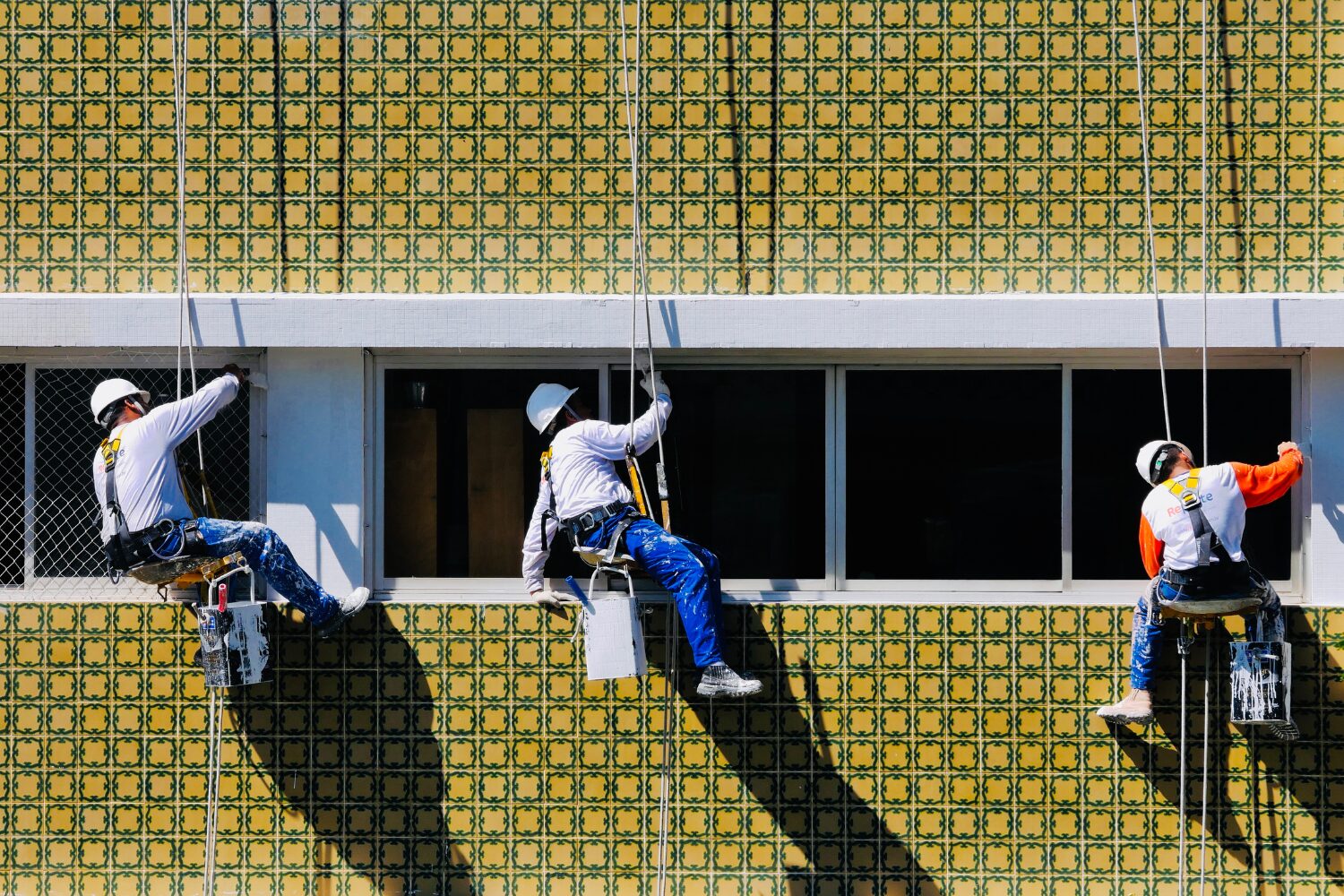Maintaining the professional appearance of your commercial property is about more than aesthetics—it directly impacts your business. A clean, polished, and well-maintained property not only boosts curb appeal but also builds trust with customers, inspires employees, and strengthens your brand identity. In a competitive market, your property’s first impression can be the difference between gaining or losing a customer.
Whether you’re refreshing the exterior of a retail storefront, updating office interiors, or tackling large-scale industrial painting projects, one thing is clear: choosing the right commercial painter matters. A fresh, professional paint job doesn’t just enhance the overall look of your building—it protects surfaces from weather, moisture, and daily wear and tear, extending the life of your property.
For business owners and property managers in San Diego, where competition is fierce and standards are high, working with a professional and experienced commercial painting contractor is the key to achieving long-lasting, high-quality results. Reliable painters can work around your schedule, minimize disruptions, and deliver a finish that meets both your visual and practical needs.
In this comprehensive guide, we will break down:
- Why hiring the right painter matters
- Key factors to look for in a commercial painter
- What to expect from start to finish
- How to avoid common pitfalls
- Top tips to ensure success
By the end of this post, you’ll be well-equipped to choose the ideal commercial painting company, ensuring your property looks great, stays protected, and delivers value for years to come.
Why Hiring the Right Commercial Painter Matters
First Impressions Are Everything
Your building’s appearance creates an immediate impression on clients, customers, and employees. Peeling paint, faded colors, or unprofessional finishes can harm your reputation and even deter potential business. A clean, fresh, and professional paint job sends the message that your business values quality, detail, and professionalism.
For businesses like retail stores, restaurants, and corporate offices, maintaining a polished image is critical. A professional commercial painter understands color psychology, helping you choose colors that match your brand and evoke the right emotions—whether it’s trust, excitement, or calmness. For instance, bright and welcoming colors might attract customers to retail stores, while cool, neutral tones can make office spaces feel focused and productive.
Protecting Your Investment
Commercial buildings face unique challenges: exposure to harsh weather conditions, UV rays, moisture, and high-traffic areas, all of which accelerate paint wear and tear. Investing in professional commercial painting not only enhances aesthetics but also extends the life of your property.
High-quality paints and coatings provide additional benefits, such as:
- Weather Resistance: Paint with UV protection prevents fading caused by the San Diego sun.
- Moisture Control: Proper primers and sealants reduce water damage and mold growth.
- Durability: Commercial-grade paints can withstand high traffic, scuffs, and impacts over time.
By protecting your property, you minimize future maintenance costs and avoid more extensive repairs down the line. A fresh, durable paint job is an investment that pays off for years to come.
Enhancing Workplace Morale and Productivity
Believe it or not, the color and condition of your workspace directly influence employee satisfaction and performance. Studies have shown that well-designed, visually appealing workspaces boost creativity, reduce stress, and improve morale. Fresh interiors that feature bright, modern colors can make the workspace feel more positive and inspiring, leading to increased productivity and job satisfaction.
For businesses, this small investment in aesthetics can lead to happier employees, reduced turnover, and better team performance overall.
Compliance and Safety
Certain industries—like healthcare, education, and manufacturing—must adhere to strict regulations regarding safety, cleanliness, and hygiene. In hospitals, for example, anti-microbial paints can prevent the spread of bacteria. For industrial buildings, fire-resistant coatings might be required for safety compliance.
Professional painters understand these unique needs and use specialized materials. By hiring the right commercial painter, you ensure your business operates safely, efficiently, and within legal standards.
Key Factors to Look for When Hiring a Commercial Painter
- Proper Licensing and Insurance
Hiring a fully licensed and insured commercial painter is non-negotiable. In California, contractors must hold a C-33 license for painting and decorating. This certification guarantees:
- The contractor meets state regulations and legal requirements.
- They have proven industry experience and expertise to deliver quality results.
When it comes to insurance, it’s critical to protect both your property and your business. Always ask for proof of:
- General liability insurance: Protects against accidental damage to your property during the project.
- Workers’ compensation insurance: Covers any injuries a crew member may sustain while working on-site.
Without proper insurance, you could be financially liable for unexpected accidents or damages—a risk that no business owner can afford. Reliable contractors, such as those at Brad Stoner Painting in San Diego, are transparent about their credentials and provide documentation upon request.
- Industry-Specific Experience
Commercial painting requires a completely different skill set and understanding compared to residential work. Each type of commercial property comes with its own set of challenges, and hiring a painter with industry-specific experience ensures better outcomes.
Ask potential contractors about their experience with:
- Office buildings: Professional, neutral finishes that enhance workplace productivity.
- Retail centers: High-traffic areas requiring durable, vibrant coatings that align with branding.
- Industrial facilities: Specialized paints like epoxy coatings or fire-resistant materials for safety and longevity.
- Multi-unit properties: Apartments, condos, or hotels that require large-scale, consistent results.
- Medical and educational institutions: Anti-microbial, eco-friendly, and low-VOC paints to meet strict health standards.
A contractor’s ability to tailor solutions to your industry’s unique requirements is crucial. For instance, repainting a warehouse may involve preparing concrete floors for epoxy coatings, while a retail store demands brand-specific color consistency to attract customers.
Pro Tip: Always request case studies, client testimonials, or a project portfolio. These examples help you gauge the contractor’s expertise, problem-solving capabilities, and ability to manage projects like yours. Reliable commercial painters should proudly share their successful projects and demonstrate their commitment to quality.
- Assess the Contractor’s Process and Timeline
A professional commercial painting contractor will have a structured, transparent process to ensure success. Painting commercial properties involves more moving parts than smaller projects, so understanding how the contractor plans to handle your job is critical for keeping the project organized, efficient, and on schedule. Here’s what you should expect:
Step 1: Initial Consultation
The process begins with an on-site consultation where the painter visits your property to assess your needs, discuss project goals, and address any special considerations. Be sure to communicate clearly:
- Areas to be painted: Interior walls, ceilings, floors, or exteriors.
- Paint preferences: Color schemes, finishes (e.g., matte, semi-gloss, high gloss), and durability requirements.
- Operational constraints: Business hours, customer traffic, and access to specific spaces.
A reputable contractor will listen to your requirements, recommend the best options for your space, and provide guidance on achieving your desired outcome within budget and timeline constraints.
Step 2: Detailed Estimate
A professional contractor will deliver a thorough, written estimate that includes:
- Labor and material costs: Clearly broken down with no hidden fees.
- Surface preparation requirements: Sanding, caulking, patching, or priming.
- Paint products and warranties: Type of paint, brand, finishes, and the expected longevity.
- Timeline: Start date, duration, and key milestones to keep the project on track.
Avoid vague or verbal quotes—these can lead to unexpected costs or delays. A detailed estimate demonstrates professionalism and helps you manage your budget effectively.
Step 3: Prepping the Space
Preparation is the foundation of a long-lasting, high-quality finish. Commercial spaces require careful attention to detail to ensure flawless results, especially for surfaces exposed to heavy traffic or weather elements. Preparation includes:
- Surface cleaning: Pressure washing exteriors or wiping down interiors to remove dust and debris.
- Surface repairs: Filling cracks, dents, or holes to create a smooth canvas.
- Priming: Applying a high-quality primer for better paint adhesion and longevity.
Proper prep work ensures your investment will last, preventing premature chipping, peeling, or discoloration.
Step 4: Painting and Quality Control
Once the space is prepared, the contractor applies the paint using advanced tools and techniques tailored to your property’s needs. Key painting methods include:
- Brushing and rolling: Precision work for detailed surfaces like trims and smaller areas.
- Airless spray systems: Ideal for large surfaces like walls, ceilings, and building exteriors, providing even coverage quickly.
Throughout the project, the crew should maintain a clean, safe workspace and adhere to strict quality control standards. Professional contractors often conduct regular inspections during the painting phase to ensure consistent, top-quality results.
Step 5: Final Inspection
Once the painting is complete, a reputable contractor will perform a walkthrough with you to verify that every detail meets your expectations. During this final step, look for:
- Uniform paint coverage with no streaks or missed spots.
- Smooth finishes with no visible imperfections.
- Clean, neat edges and transitions between surfaces.
If any touch-ups are required, a professional team will address them promptly to ensure the job is perfect.
Why This Matters: By following a structured process, experienced contractors not only ensure a stunning paint job but also minimize downtime for your business, keeping everything on schedule and within budget. When evaluating potential painters, ask them to explain their process and timeline. This will give you confidence that your project is in good hands.
- Choosing the Right Paints and Materials
Why Paint Quality Matters
Choosing the right paint for a commercial project is about more than just color—it’s about durability, longevity, and value. Cheap paint might save money upfront, but it won’t hold up to daily wear and tear or environmental stressors, leading to frequent repainting and higher costs in the long run.
Professional commercial painters prioritize high-quality paints from trusted brands like Sherwin-Williams, Benjamin Moore, Dunn Edwards and Behr. These premium products offer:
- Resistance to Peeling, Chipping, and Fading: Ensures the paint looks new for years, even in high-traffic areas or under direct sunlight.
- Withstanding Harsh Conditions: High-quality paints are designed to endure weather, moisture, and other environmental factors—perfect for San Diego’s coastal climate.
- Better Coverage: Fewer coats are needed, saving time and labor costs while delivering a smoother, more even finish.
Investing in quality paint reduces long-term maintenance costs and preserves the professional look of your building.
Specialty Coatings for Commercial Projects
Commercial spaces often have unique requirements that standard paints cannot meet. Specialty coatings address these challenges and add functionality to the painted surfaces. Common examples include:
- Epoxy Coatings: Ideal for warehouse or industrial floors, epoxy paints provide a tough, durable finish that resists chemicals, heavy machinery, and foot traffic.
- Anti-Microbial Paints: Essential for healthcare facilities, kitchens, and schools, these paints inhibit the growth of mold, bacteria, and mildew.
- Fire-Resistant Coatings: For businesses that need to meet strict safety standards, fire-resistant paints can help protect structures and occupants by slowing fire spread.
- Weatherproof and UV-Resistant Paints: Protect exteriors from moisture, fading, and damage caused by prolonged sun exposure, which is critical in sunny regions like San Diego.
Discuss your building’s unique requirements with your painter to determine which specialty coatings will provide the most value and protection.
Eco-Friendly Paint Options
Today’s businesses are more conscious of their environmental impact, and paint choices are no exception. Ask your contractor about eco-friendly paint options, such as:
- Low-VOC (Volatile Organic Compounds) Paints: These paints emit fewer chemicals, reducing harmful emissions and improving indoor air quality—especially important in office spaces and schools.
- Zero-VOC Paints: Completely free of VOCs, these paints are safe for sensitive environments, like hospitals or daycares.
Not only do eco-friendly paints contribute to healthier spaces, but they also help businesses align with green building standards or achieve sustainability certifications like LEED.
Why It Matters: By using the right paints and materials, you ensure your commercial project looks professional, lasts longer, and meets safety or environmental standards. Premium products and specialty coatings protect your investment while supporting your property’s functional needs.
- Communication and Professionalism
Effective communication and professionalism are critical when hiring a commercial painter. A painting project, especially in a commercial setting, involves many moving parts: timelines, access to spaces, employee or customer traffic, and unexpected challenges. A contractor who prioritizes clear, responsive communication can make the entire process smooth, efficient, and stress-free.
Key Communication Qualities to Look For
- Prompt Responses: Your contractor should respond quickly to calls, emails, and messages. A delayed response can signal disorganization and may foreshadow issues throughout the project.
- Regular Project Updates: Professional contractors keep clients informed every step of the way, providing status updates, addressing concerns, and ensuring that the project stays on track.
- Clear Explanations: Whether it’s about the materials being used, timelines, or challenges that arise, a good contractor will explain things in simple terms. You should never feel in the dark about what’s happening.
Demonstrating Professionalism
Professionalism is more than showing up on time—it’s about respecting your time, property, and operational needs.
Signs of Professionalism Include:
- Punctuality: The crew arrives when promised and sticks to the agreed timeline, minimizing unnecessary delays.
- Clean and Safe Workspaces: The contractor maintains a tidy workspace throughout the project. Tools, ladders, and materials should be neatly organized to ensure safety for employees, clients, and visitors.
- Minimizing Disruptions: For businesses that operate during painting projects, professionals will take extra measures to work quietly and efficiently. They may offer flexible hours—nights, weekends, or off-hours—to ensure minimal interference with your daily operations.
For example, if you run a retail store or an office, a professional team might section off areas being painted or stagger work to keep the space usable and safe for employees and customers.
The Value of a Collaborative Approach
An experienced commercial painting contractor works collaboratively with clients to meet goals and expectations. Whether it’s choosing colors, understanding branding requirements, or adjusting schedules, they take the time to listen, advise, and execute a plan that aligns with your business needs.
By combining clear communication, professionalism, and flexibility, contractors ensure the project is a success without causing unnecessary headaches.
Why It Matters: Contractors who excel in communication and professionalism make the painting process seamless and stress-free. When your painter prioritizes transparency, organization, and respect for your property, you can focus on running your business with confidence.
- Warranty and Aftercare Services
Why Warranties Matter
A reputable commercial painting company will always stand behind their work with comprehensive warranties. Warranties serve as a promise of quality and accountability, ensuring that both the labor and materials meet the agreed-upon standards.
Two Key Warranty Types to Look For:
- Labor Warranty: This covers workmanship issues, such as peeling, bubbling, or improper paint application. If defects occur due to faulty work, the contractor should fix them at no additional cost.
- Materials Warranty: High-quality paints come with manufacturer warranties, ensuring the durability and longevity of the product. If the paint fades or deteriorates prematurely due to product defects, it can often be replaced under warranty.
Before signing any contract, ask for specifics on the warranty length, coverage terms, and exclusions.
Pro Tip: Read the fine print. Ensure that the warranty details both labor and materials to avoid potential surprises down the line. A confident and experienced commercial painter, like Brad Stoner Painting, will gladly explain their warranty policies and coverage.
Aftercare and Maintenance
Even with the best materials and workmanship, paint requires maintenance to keep it looking fresh and professional. Look for contractors that provide aftercare services to extend the life of your paint job and protect your investment.
Common Aftercare and Maintenance Services Include:
- Touch-Ups: Over time, high-traffic areas like lobbies, hallways, or exteriors may show minor scuffs or wear. Scheduled touch-ups ensure these areas always look pristine.
- Periodic Inspections: Some contractors offer routine inspections to identify potential issues—like small cracks or peeling—before they worsen, saving you time and money.
- Preventative Maintenance: Cleaning painted surfaces, power-washing exteriors, and resealing protective coatings help preserve the paint and prevent long-term damage.
For example, in a busy commercial setting like retail stores or office buildings, a proactive maintenance plan can ensure your property always looks polished and professional, leaving a positive impression on clients, employees, and visitors.
- Reading Reviews and Asking for References
Where to Find Reviews
In today’s digital age, reviews are one of the best ways to gauge a commercial painter’s reputation and work quality. A reputable painting contractor will have an established online presence with reviews on multiple platforms. Key places to check include:
- Google My Business: Look for detailed reviews that highlight both strengths and areas for improvement.
- Yelp: Focus on ratings and customer comments, particularly for businesses like yours.
- Better Business Bureau (BBB): Check for accreditation, complaints, and resolutions to evaluate the contractor’s reliability.
When reading reviews, look for consistent positive feedback regarding:
- Quality of Work: Was the painting job professional, clean, and long-lasting?
- Timeliness and Professionalism: Did the contractor meet deadlines and communicate effectively throughout the project?
- Customer Satisfaction: Are past clients happy with the results and overall experience?
Ask for References
Don’t hesitate to request references directly from the contractor. A professional painting company should provide contact details for recent clients. When speaking with references, ask specific questions such as:
- Were you satisfied with the results? Did the finished project meet or exceed expectations?
- Was the project completed on time and within budget? Were there any unexpected delays or costs?
- Would you hire this painter again? A repeat client is a strong indicator of trust and quality service.
Pro Tip: Look for reviews and references that match the scope of your project. If you’re managing a large-scale commercial repaint, ensure the contractor has a track record with similar jobs. Consistent, positive feedback reassures you that you’re hiring a painter you can trust.
Common Pitfalls to Avoid When Hiring a Commercial Painter
- Choosing Based on Price Alone: Low bids often mean shortcuts or poor-quality materials.
- Skipping the License and Insurance Check: Unlicensed contractors put you at financial risk.
- Ignoring Experience: Choose painters with proven expertise in commercial projects.
- Vague Estimates: Always get a detailed, written contract.
Final Tips for a Successful Commercial Painting Project
- Plan Ahead: Schedule the project during off-hours or slow seasons.
- Be Clear About Expectations: Communicate timelines, goals, and constraints upfront.
- Trust the Experts: Rely on experienced commercial painters to recommend the best materials and techniques.
Why Brad Stoner Painting Is San Diego’s Top Choice for Commercial Painting
For over 38 years, Brad Stoner Painting has been the trusted choice for businesses across San Diego. Their team of licensed, insured, and experienced professionals delivers:
- Exceptional Quality: Premium materials and meticulous attention to detail.
- Reliable Service: On-time completion with minimal disruptions.
- Comprehensive Solutions: Interior, exterior, and specialty commercial painting.
Whether you’re refreshing an office, updating a retail space, or tackling an industrial project, Brad Stoner Painting has the expertise to bring your vision to life.
Ready to Get Started? Contact Brad Stoner Painting Today!
📞 Call us at (858) 258 – 5752
🌐 Visit bradstonerpainting.com
Transform your commercial property with the experts in San Diego.





